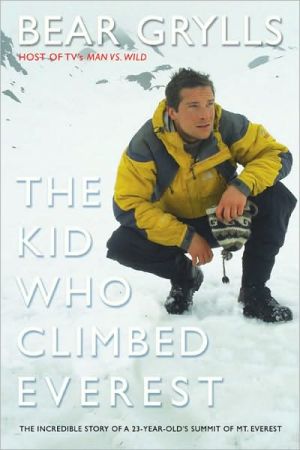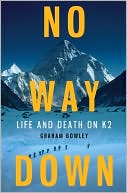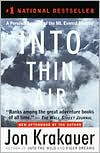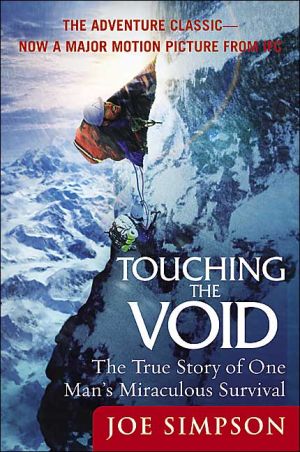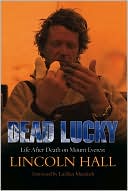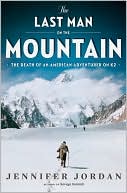The Kid Who Climbed Everest: The Incredible Story of a 23-Year-Old's Summit of Mt. Everest
In 1996, a twenty-three-year-old soldier in the British Army was flying over an African desert on a routine parachute jump. He had a lot to look forward to-a long career ahead of him in the army, a beautiful girlfriend back home. But those dreams were cut short when his parachute failed to open at eleven thousand feet. He had cracked three vertebrae and had come within a fraction of an inch of severing his spinal cord. A grueling eight months of physical therapy followed. Bear had to retrain...
Search in google:
Author featured on the Oprah Winfrey Show See the author's interview with Oprah:http://www.oprah.com/tows/pastshows/200701/tows_past_20070131.jhtml THE KID WHO CLIMBED EVEREST is a tale of courage and determination. Bear's quest for funding for his expedition, his seventy days on Everest's southeast face, and a narrow brush with death after a fall into a crevasse at nineteen thousand feet, make the story an essential read for anyone who's ever had a dream and made it come true. Publishers Weekly For a year, Grylls held the record for the Youngest Englishman on the Hill for his summit ascent at age 23 (only to be bested the following year by a 22-year-old). Grylls, while serving in the army, suffered a parachuting accident that nearly severed his spinal cord. After eight months in a military rehab center, he decided to leave the military and climb the legendary Everest. Barely escaping death (he fell into a crevasse at 19,000 feet), he reached the summit just 18 months after his accident. Unfortunately, Grylls's account of 70 days on Everest has a flat pitch, stiff syntax and little insight to offer on the experience of reaching for the top of the world save earnest observations on grit, body functions at high altitudes, his grandpa, faith, queen and country. The transcendent folly and physical drama of climbing above 26,000 feet were sharp narrative tools in Jon Krakauer's Into Thin Air, but the Kid can't quite elaborate on how he felt as he passed the decayed, mummified body of Rob Hall, who tragically failed to scale the summit ridge. Grylls's report from the top of the world is almost without discernible color except the "bully" attitude Grylls and his mates brought along from England and took back home after a few celebratory ales in Kathmandu. His story adds little to the ever-expanding Everest genre. (May) Forecast: No matter how unexceptional they might appear to the uninitiated, diehard Everest fans never seem to tire of books like this. The effusive blurb from British Prime Minister Tony Blair certainly won't hurt sales, either. Copyright 2001 Cahners Business Information.
(1) Desert Plunge (2) Reaching Out (3) A World Apart (4) Moving Mountains (5) Among the Giants (6) Last Call (7) Breaking the Ice (8) Warning Shots (9) Brothers in Arms (10) Easter on the Ice (11) Make or Break (12) Summit Fever (13) Torn Apart (14) Stone's Throw (15) Alone (16) Above the Clouds (17) Borrowed Time (18) Why (Postscript) (Appendices)
\ Publishers Weekly - Publisher's Weekly\ For a year, Grylls held the record for the Youngest Englishman on the Hill for his summit ascent at age 23 (only to be bested the following year by a 22-year-old). Grylls, while serving in the army, suffered a parachuting accident that nearly severed his spinal cord. After eight months in a military rehab center, he decided to leave the military and climb the legendary Everest. Barely escaping death (he fell into a crevasse at 19,000 feet), he reached the summit just 18 months after his accident. Unfortunately, Grylls's account of 70 days on Everest has a flat pitch, stiff syntax and little insight to offer on the experience of reaching for the top of the world save earnest observations on grit, body functions at high altitudes, his grandpa, faith, queen and country. The transcendent folly and physical drama of climbing above 26,000 feet were sharp narrative tools in Jon Krakauer's Into Thin Air, but the Kid can't quite elaborate on how he felt as he passed the decayed, mummified body of Rob Hall, who tragically failed to scale the summit ridge. Grylls's report from the top of the world is almost without discernible color except the "bully" attitude Grylls and his mates brought along from England and took back home after a few celebratory ales in Kathmandu. His story adds little to the ever-expanding Everest genre. (May) Forecast: No matter how unexceptional they might appear to the uninitiated, diehard Everest fans never seem to tire of books like this. The effusive blurb from British Prime Minister Tony Blair certainly won't hurt sales, either. Copyright 2001 Cahners Business Information.\ \ \ \ \ Library JournalThis is an exhilarating story of the youngest (at the age of 23) Briton ever to scale Mount Everest. Grylls recounts his battle against nature and his own physical and mental limits. He brilliantly details his long, slow trek up the mountain, where altitude acclimations become critical as oxygen limitations, headaches, and lethargy challenge all those who attempt to climb the 29,035 feet above sea level. What makes Grylls's story all the more enthralling is that he had fractured three vertebrae and came close to severing his spinal cord in a free-fall parachuting accident two years prior, while serving in the British Army. After spending months in rehabilitation, he decided to pursue his childhood dream to climb the world's highest peak. Even considering the glut of Everest works, this is an excellent book of personal triumph and should serve as an inspiration to all who read it. Highly recommended for all public libraries. Tim Delaney, Canisius Coll., Buffalo Copyright 2001 Cahners Business Information.\ \ \ Kirkus ReviewsAnother stone added to the growing mountain of Everest adventures. Newcomer Grylls was serving in the British army in 1996 when he suffered a parachuting accident that left him with three broken vertebrae and a badly bruised spinal cord. In the months of physical therapy that followed, this avid climber rekindled a childhood dream to climb the world's tallest peak—a feat that very few mountaineers younger than 30 have ever managed to pull off. "Everest is no place to prove yourself," the author admits. "The likelihood of reaching the summit is so slim that you're inevitably setting yourself up to be disappointed." Even so, he talked his way into a slot on a 1998 British expedition led by a tough-as-nails ex-Marine commando who urged his teammates through the icy, windswept hells that Grylls describes quite effectively. For instance, he tells us that one area of Everest, the Icefalls, is so named because great spears of ice break off the sun-warmed slope in mid-afternoon, sharp and heavy enough to kill anyone standing "deep within the jaws of the overhang"; his account of the party's race across the region is a fine set piece that doesn't compare at all badly to the best Everest narratives. Against all odds, the author endured the Icefalls, the Lhotse Face, and other challenges the mountain threw up along the way, eventually arriving at the aptly named Death Zone, where, hyperventilating, he communed with the body of Rob Hall (whose death stands at the dramatic heart of Jon Krakauer's 1997 account, Into Thin Air) and then took the summit—all at the tender age of 23. Occasionally breathless and clunky, this is a vivid and inspiring read all the same, sure to find a largeaudience among outdoor-adventure and climbing buffs.\ \
